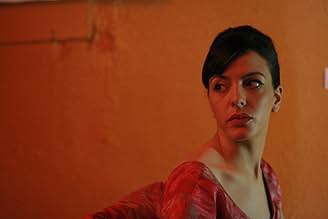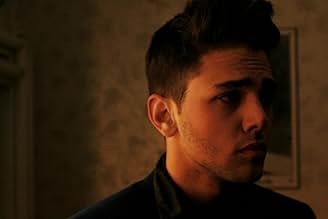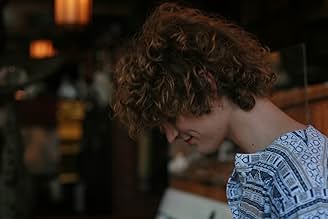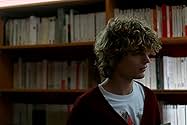IMDb रेटिंग
7.0/10
31 हज़ार
आपकी रेटिंग
अपनी भाषा में प्लॉट जोड़ेंThe story of three close friends who are involved in a love-triangle.The story of three close friends who are involved in a love-triangle.The story of three close friends who are involved in a love-triangle.
- पुरस्कार
- 6 जीत और कुल 15 नामांकन
Magalie Lépine Blondeau
- Jeune femme 2
- (as Magalie Lépine-Blondeau)
Benoît McGinnis
- Baise 2
- (as Benoit McGinnis)
François-Xavier Dufour
- Baise 3
- (as François Xavier Dufour)
फ़ीचर्ड समीक्षाएं
21-year-old Xavier Dolan is fast becoming the star of Canadian cinema. The Quebec prodigy stormed on to the international scene with his debut J'ai tué ma mere (I killed My Mother) winning three awards at Cannes last year.
His follow-up is Les Amours Imaginaires (Heartbeats in English) and centres on a three-way love triangle. Dolan himself plays Francis, a gay Montrealer who becomes infatuated with a young socialite named Nicolas, played by Niels Schneider. Instantaneously, Francis' close friend Marie, played by Monia Chokri develops feelings of her own for Nicolas.
As the tumultuousness of love for Nicolas deepens for the two of them their close friendship begins to suffer. The two friends become embroiled in a struggle to please Nicolas who appears to represent Dolan's own ideal.
The theme of idealization is explored notably in Alfred Hitchcock's Vertigo and Thomas Mann's Death in Venice which was made into a film by Luchino Visconti. There is a scene at a party where Marie envisions Michalangelo's David, the artist' own physical ideal when staring admirably at Nicolas.
Romantic obsession begins to take hold of the two friends as they vie for the affection of someone who will never return their love. Like in I killed My Mother, his follow up is about Dolan's struggling with his own homosexuality. The film is also a meditation on the senselessness of love and why its own madness is what makes it so appealing.
Dolan is undoubtedly a big talent. Monia Chokri who plays the muse of the film shines the brightest in front of the camera. Her archaic hairstyle and fashion sense would remind anyone familiar with French actress Anna Karina. And that provides a clue in who Dolan draws his cinematic inspiration from.
Three-way conflicts were a hallmark of Jean-Luc Godard and other new wave directors like Francois Truffaut. Dolan may have drawn his inspiration from Truffaut's own Jules and Jim. But Les Amours Imaginaires has many more references to Godard's early work.
Everything down to the scene settings, cultural references and camera shots are deliberately taken from Godard's early classics such as Breathless and Band of Outsiders. The characters too represent the remnants of the 1960s-style cultural rebellion that Godard's films often explored which still thrives in Montreal today.
One final stylistic note, the film also includes a roundtable of characters not related to the main story discussing relationships. Dolan manages to make it relevant to the story and continues the tradition set by Godard in Masculine Feminine. The third sequence however does run a bit too long.
Les Amours Imaginaires is already out on DVD in Canada. It will be released in theatres in the United States on February 1, 2011 so look out for it.
His follow-up is Les Amours Imaginaires (Heartbeats in English) and centres on a three-way love triangle. Dolan himself plays Francis, a gay Montrealer who becomes infatuated with a young socialite named Nicolas, played by Niels Schneider. Instantaneously, Francis' close friend Marie, played by Monia Chokri develops feelings of her own for Nicolas.
As the tumultuousness of love for Nicolas deepens for the two of them their close friendship begins to suffer. The two friends become embroiled in a struggle to please Nicolas who appears to represent Dolan's own ideal.
The theme of idealization is explored notably in Alfred Hitchcock's Vertigo and Thomas Mann's Death in Venice which was made into a film by Luchino Visconti. There is a scene at a party where Marie envisions Michalangelo's David, the artist' own physical ideal when staring admirably at Nicolas.
Romantic obsession begins to take hold of the two friends as they vie for the affection of someone who will never return their love. Like in I killed My Mother, his follow up is about Dolan's struggling with his own homosexuality. The film is also a meditation on the senselessness of love and why its own madness is what makes it so appealing.
Dolan is undoubtedly a big talent. Monia Chokri who plays the muse of the film shines the brightest in front of the camera. Her archaic hairstyle and fashion sense would remind anyone familiar with French actress Anna Karina. And that provides a clue in who Dolan draws his cinematic inspiration from.
Three-way conflicts were a hallmark of Jean-Luc Godard and other new wave directors like Francois Truffaut. Dolan may have drawn his inspiration from Truffaut's own Jules and Jim. But Les Amours Imaginaires has many more references to Godard's early work.
Everything down to the scene settings, cultural references and camera shots are deliberately taken from Godard's early classics such as Breathless and Band of Outsiders. The characters too represent the remnants of the 1960s-style cultural rebellion that Godard's films often explored which still thrives in Montreal today.
One final stylistic note, the film also includes a roundtable of characters not related to the main story discussing relationships. Dolan manages to make it relevant to the story and continues the tradition set by Godard in Masculine Feminine. The third sequence however does run a bit too long.
Les Amours Imaginaires is already out on DVD in Canada. It will be released in theatres in the United States on February 1, 2011 so look out for it.
Les Amours Imaginaires is potently beautiful purely based on its plot and the way the story is told. Its content is universal which allows anyone to relate to the story. It speaks about love, loss, rejection, and how love is all about our individual perceptive. This complex story breaks the stereotypes of sexual identity and shows that we cannot always chose who we fall in love with.
Dolans camera use and choice of colour is visually stimulating and beautiful to watch. He captures the beauty of Montreal and the culture that comes with it. The casting is incredible making the story very realistic.
What is even more important is that Les Amours Imaginaires is a story of young love told from the perceptive of a young man. We often see films about youth written or directed by film makers of a different time. This is a film that has a modern perceptive on the complexities of love.
If you have ever been in love, this film will be the speak to you like no other.
Dolans camera use and choice of colour is visually stimulating and beautiful to watch. He captures the beauty of Montreal and the culture that comes with it. The casting is incredible making the story very realistic.
What is even more important is that Les Amours Imaginaires is a story of young love told from the perceptive of a young man. We often see films about youth written or directed by film makers of a different time. This is a film that has a modern perceptive on the complexities of love.
If you have ever been in love, this film will be the speak to you like no other.
'Heartbeats' is a fun little film, a sort of Gallic rom-com, although don't expect the obligatory happy-ending where the two protagonists rejected in love hook up with each other. A simple story of unrequited love and ordinary obsessiveness, the film cuts to the chase in spite of its good looking characters and chic vibe: we're not all equally attractive, and we don't love another in equal amounts. The rejecter in this story doesn't even do anything particularly wrong, except treat others with a combination of openness and carelessness that is surely only natural when blessed with a certain type of good looks. The film's resolution of his hitherto ambiguous sexuality is clever, and the film as a whole is brilliantly orchestrated with a collection of popular songs, from different eras, each of which nonetheless is particularly chosen to fit a certain mood and to complement the images on screen at that time. Oddly, in spite of the emotional pain its characters are in, this film is a stylised paean to being young, beautiful and in love: the fact that it hurts only makes it sweeter.
In the new film auteur sweetheart Xavier Dolan's sophomore effort we receive a stylish and vague story about a passion for love. A love shared by two friends Marie (Mona Chokri) and Francis (the all-star Xavier Dolan) towards a sumptuously corny blond-haired egotripping Adonis Nicolas (Niels Schneider) a.k.a. Nico. Set to some ear-tasty music fronted by a french Dalida sung version of "Bang Bang" we receive a story about the tensions, exasperations and unfulfilled promise of expectations. Intermingled occasionally by quasi-documentary tidbit lessons of love from random people strangely balancing on the edge of mockumentary territory.
All the above is set as a backdrop to a plethora of homages to french New Wave, Jim Jarmusch, Audrey Hepburn and... Wong Kar-Wai. Albeit the nods to Kar-Wai are more than slight, as to an extent it basically felt like Dolan was basically attempting a quasi-farcical remake of the Asian pivotal work "In the Mood for Love". All inclusive. Featuring slowed-down long trailing shots, coloured cinematography, brilliantly focused sensual scenes, retro music and even an extremely overdone love poem to cigarettes and smoke. After basically ripping off Christopher Doyle's cinematography Xavier Dolan pasted together a piece of post-post-modernism, but without any of the subtle magic, power and enticement of Kar-Wai's original. The additional issue lies with the overusing of slow shots coupled with barrages of music, that lack ingenuity or class, instead bring about a repetitiveness problem and most of time seem like a tasteless parody of Doyle. Not to be too hard on Doyle even Kar-Wai himself was unable to imprint his own style into a Western film ("The Blueberry Nights"), which seems increasingly to prove that his solutions are specifically best made in Asia. Nonetheless I would go as far as to say that Dolan intended such strong borrowing after noticing the strong story similarities, as both movies are not about love itself, but about the longing for love.
Leaving the issue of almost blatant plagiarism the movie does show a lot of promise on a purely plot level and to some extent this promise is fulfilled. After slowly plodding out the story itself it does manage to engage, even though neither Dolan or Chokri have the stage presence or impact to actually convey their emotion. Almost no tension is created between characters and I found most scenes lacking dramatically. The only actor who managed to deliver was Schneider, but his role was being an egocentric and slightly clueless love-boy, so as such he was a secondary character.
The movie faces additional issues with overly worked lines with pop-cultural reference and tough words, which intend to convey a feeling of intellectuality, but are essentially unable to gloss over the fact that this seems forcibly awkward bordering on banal. Additionally other dialogues lack focus or the initially interesting idea is overused to absurdity (especially regarding people losing their head and gibbering nonsense under high emotionality). Given the movie lasts over 100 minutes with ideas for about 30-35 minutes of intriguing plotting the rest is filled with slow-motion shots with music, some uninspiring chatter and some utterly pointless forgettable side events. Despite some admirable qualities "Les amours..." seems a bit childish plot-wise and before anyone can really take Dolan seriously he really seriously needs to... well... grow up...
To add to insult the interloping interviews, which occasionally cut into the main story, lack focus, are mostly tiresome and forcibly intellectual self-styled hipster sobbings. Save for one woman with glasses, which actually adds some interesting depth to the movie. Plus the ending three minutes or so of the movie are pointless, petty and basically are a result of the overzealous director wanting to inflict some badly focused revenge...
On the positive side the use of music is perfection, whilst the cinematography is spectacularly beautiful and drenched in colour. The movie was impressive on a script level to the extent that given a bit more experience and a touch of ingenuity Dolan can actually reach the stars and make a classic movie. But this attempt is just a far cry to divinity.
I am fully aware that this may be a minority opinion, but I can't gloss over the fact that watching this movie was tiresome, uneventful and had an overwhelming feeling of repetitiveness. To sum it up: Xavier Dolan is no Tony Leung, Mona Chokri is no Maggie Cheung and "Le amours imaginaires" will never be "In the Mood for Love".
All the above is set as a backdrop to a plethora of homages to french New Wave, Jim Jarmusch, Audrey Hepburn and... Wong Kar-Wai. Albeit the nods to Kar-Wai are more than slight, as to an extent it basically felt like Dolan was basically attempting a quasi-farcical remake of the Asian pivotal work "In the Mood for Love". All inclusive. Featuring slowed-down long trailing shots, coloured cinematography, brilliantly focused sensual scenes, retro music and even an extremely overdone love poem to cigarettes and smoke. After basically ripping off Christopher Doyle's cinematography Xavier Dolan pasted together a piece of post-post-modernism, but without any of the subtle magic, power and enticement of Kar-Wai's original. The additional issue lies with the overusing of slow shots coupled with barrages of music, that lack ingenuity or class, instead bring about a repetitiveness problem and most of time seem like a tasteless parody of Doyle. Not to be too hard on Doyle even Kar-Wai himself was unable to imprint his own style into a Western film ("The Blueberry Nights"), which seems increasingly to prove that his solutions are specifically best made in Asia. Nonetheless I would go as far as to say that Dolan intended such strong borrowing after noticing the strong story similarities, as both movies are not about love itself, but about the longing for love.
Leaving the issue of almost blatant plagiarism the movie does show a lot of promise on a purely plot level and to some extent this promise is fulfilled. After slowly plodding out the story itself it does manage to engage, even though neither Dolan or Chokri have the stage presence or impact to actually convey their emotion. Almost no tension is created between characters and I found most scenes lacking dramatically. The only actor who managed to deliver was Schneider, but his role was being an egocentric and slightly clueless love-boy, so as such he was a secondary character.
The movie faces additional issues with overly worked lines with pop-cultural reference and tough words, which intend to convey a feeling of intellectuality, but are essentially unable to gloss over the fact that this seems forcibly awkward bordering on banal. Additionally other dialogues lack focus or the initially interesting idea is overused to absurdity (especially regarding people losing their head and gibbering nonsense under high emotionality). Given the movie lasts over 100 minutes with ideas for about 30-35 minutes of intriguing plotting the rest is filled with slow-motion shots with music, some uninspiring chatter and some utterly pointless forgettable side events. Despite some admirable qualities "Les amours..." seems a bit childish plot-wise and before anyone can really take Dolan seriously he really seriously needs to... well... grow up...
To add to insult the interloping interviews, which occasionally cut into the main story, lack focus, are mostly tiresome and forcibly intellectual self-styled hipster sobbings. Save for one woman with glasses, which actually adds some interesting depth to the movie. Plus the ending three minutes or so of the movie are pointless, petty and basically are a result of the overzealous director wanting to inflict some badly focused revenge...
On the positive side the use of music is perfection, whilst the cinematography is spectacularly beautiful and drenched in colour. The movie was impressive on a script level to the extent that given a bit more experience and a touch of ingenuity Dolan can actually reach the stars and make a classic movie. But this attempt is just a far cry to divinity.
I am fully aware that this may be a minority opinion, but I can't gloss over the fact that watching this movie was tiresome, uneventful and had an overwhelming feeling of repetitiveness. To sum it up: Xavier Dolan is no Tony Leung, Mona Chokri is no Maggie Cheung and "Le amours imaginaires" will never be "In the Mood for Love".
I agree with another reviewer that love is not the real subject of the film. The characters think they're feeling love, and they're certainly looking for love, but in such a shallow and conniving way they're incapable of getting beyond mere sensuality at best. This is a film which starts out superficially, as superficial as its characters. Their lack of depth is underlined by the interviews of more interesting people that we would almost rather be following, but we're stuck with this trio of narcissists trying to impress each other through attitude, clothes, and money-- each locked within his competitive self and each masturbating in his or her own way. The director's own vanity fits in perfectly with his fetishist approach, the Wong Kar Wai-like sensual slow-motion to heighten gesture and make us take a long hard look at these high-strung game players.
The viewer must be patient and wait for the second part when the film, in dealing with the repercussions from the narcissism of the first part, takes on depth. It is during the last twenty minutes that the actor/director succeeds in dealing with real emotions, not the imitation ones of the first half. Now a new tension sets in that builds to its vociferous climax where the actors are required to go beyond what they have demonstrated up to this point. Watching these neurotic Montréalians (when they finally grow up, they can be the manic-depressive characters in a Denys Arcand film), the viewer goes through the gamut of his or her own memories of attraction and rejection, bouncing around like the ping-pong balls that the expressive actors represent in their own attraction/flirtation/appeasement fluctuations. In fact, the more the film is watched with introspection, the more relevant it becomes.
The viewer must be patient and wait for the second part when the film, in dealing with the repercussions from the narcissism of the first part, takes on depth. It is during the last twenty minutes that the actor/director succeeds in dealing with real emotions, not the imitation ones of the first half. Now a new tension sets in that builds to its vociferous climax where the actors are required to go beyond what they have demonstrated up to this point. Watching these neurotic Montréalians (when they finally grow up, they can be the manic-depressive characters in a Denys Arcand film), the viewer goes through the gamut of his or her own memories of attraction and rejection, bouncing around like the ping-pong balls that the expressive actors represent in their own attraction/flirtation/appeasement fluctuations. In fact, the more the film is watched with introspection, the more relevant it becomes.
क्या आपको पता है
- ट्रिवियाDirector and fellow actor Xavier Dolan confirmed that he was inspired by Woody Allen's film Husbands and Wives (1992) for the camera framing jerks to make it feel as if it was a documentary.
- गूफ़When Nicolas and Marie by accident run into Francis at the Vietnamese restaurant, Francis introduces Nicolas to his friend Antony. However, in the first scene of the movie you can see that Nicolas already has met Antony as they all sit at the same dinner table. There is nothing to say that either Francis didn't realize they knew each other, or that Nicolas and Antony were merely playing dumb and avoiding an awkward situation.
- भाव
Marie: I love to smoke. Smoking a cigarette is like... forgetting. When I hit rock bottom, it's all I have. Light up, smoke up, shut the fuck up. It hides the shit. The smoke... hides... the shit. There's menthol and vanilla. Some people like 'em. Menthol cigarette. Vanilla cigarette. Chocolate cigarette. Cigarette cigarette. Cigarettes clearly keep me from going crazy. Keeps me alive. It keeps me alive until I die.
- कनेक्शनFeatured in Ebert Presents: At the Movies: एपिसोड #1.6 (2011)
- साउंडट्रैकLe Temps est Bon
Music by Stéphane Venne
Lyrics by Stéphane Venne
Performed by Isabelle Pierre
Courtesy of Disques Mérite
टॉप पसंद
रेटिंग देने के लिए साइन-इन करें और वैयक्तिकृत सुझावों के लिए वॉचलिस्ट करें
- How long is Heartbeats?Alexa द्वारा संचालित
विवरण
- रिलीज़ की तारीख़
- कंट्री ऑफ़ ओरिजिन
- आधिकारिक साइट
- भाषाएं
- इस रूप में भी जाना जाता है
- Heartbeats
- फ़िल्माने की जगहें
- उत्पादन कंपनियां
- IMDbPro पर और कंपनी क्रेडिट देखें
बॉक्स ऑफ़िस
- बजट
- CA$6,00,000(अनुमानित)
- US और कनाडा में सकल
- $68,723
- US और कनाडा में पहले सप्ताह में कुल कमाई
- $7,197
- 27 फ़र॰ 2011
- दुनिया भर में सकल
- $8,43,423
- चलने की अवधि1 घंटा 41 मिनट
- रंग
- ध्वनि मिश्रण
- पक्ष अनुपात
- 1.85 : 1
इस पेज में योगदान दें
किसी बदलाव का सुझाव दें या अनुपलब्ध कॉन्टेंट जोड़ें


![Bande-annonce [OV] देखें](https://m.media-amazon.com/images/M/MV5BNjAwY2Y4NTgtYzZiYi00MjYyLTg5NzMtZTkwZGU0NTMzMTk2XkEyXkFqcGdeQXRyYW5zY29kZS13b3JrZmxvdw@@._V1_QL75_UX500_CR0)



































